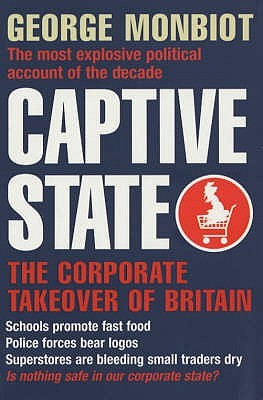 Please buy the book here. See review by Nicholas Lezard.
Please buy the book here. See review by Nicholas Lezard.
This book is compulsory reading. A devastating indictment of the corruption at the heart of the British State. George Monbiot uncovers what many have suspected but few have been able to prove: that corporations have become so powerful they now threaten the foundations of democratic government. Many of the stories he recounts have never been told before, and they could scarcely be more embarrassing to a government that claims to act on behalf of all of us. Effectively, the British government has collaborated in its own redundancy, by ceding power to international bodies controlled by corporations. Captive State highlights the long term threat to our society and ultimately shows us ways in which we can hope to withstand the might of big business.
- The Skye Bridge, where residents have to pay over a fiver each way for the privilege of visiting and returning from the mainland. The Forth Bridge, many times longer, costs 80p for a two-way trip. The Skye Bridge was the first major PFI project, and in its breathtakingly cynical budgeting (the government – i.e. us – contributed £16 million, a tidy sum for something that the private sector was meant to be building by itself), and its contempt for the people who actually use it, symbolises and typifies everything that is wrong with letting private money into what should be state enterprises. What PFI seems to mean is this: the government washes its hands of all responsibility save that of making life difficult for those who object.
- The NHS. We have heard about operational failures at PFI hospitals; here Monbiot explains why these projects are failures (they cost more money and reduce the capacity of the NHS.)
- The smashing of Southampton – St Mary’s (Bellway Homes) and West Quay (Imry) – why there are so many crappy, characterless shopping centres in our smaller cities and towns.
- How to buy planning permission: the planning system discriminates against local people, e.g. the Royal Borough of Kensington and Chelsea – only developers can appeal against a council’s decision. Companies can give money or benefits in kind to a local authority for receiving planning permission.
- Economic Cleansing: how the superstores conquered Britain – makes for excruciating reading, for what one may have supposed was a banal matter, that is, shopping, is here seen as a matter of vast corporations destroying the livelihoods, and often the lives, of shopkeepers, not to mention making life inconvenient and socially impoverished for those who used to use them. The ruthlessness of the supermarkets’ business practices is barbaric.
- The Fat Cats Directory notes the names of the high and mighty – bigwigs from the private sector, mostly – who now infest government-appointed boards. Stephanie Monk, for example, who as Human Resources Director of the Granada Group plc presumably had knowledge of their decision to cut some workers’ wages from £140 to £100 a week, is a member of the Low Pay Commission.
- Monsanto’s magic potion – genetically modified crops
- A padlock on the food chain – the monopolistic power of patents
- The corporate takeover of the Universities – the closure of Edinburgh University’s Centre for Human Ecology (now run as a charity), the compromise of academic freedom by funding arrangements.
- The corporate bid for world domination – the Multilateral Agreement on Investment
- A troublemakers’ charter – people seeking to challenge corporate power are being increasingly regulated, and business less regulated. Other concerns are: education as a market opportunity (a la USA); ineffective regulation of advertising – “pester power” is OK yet “political” adverts by pressure groups are banned;, the Terrorism Act forbids violence against property for advancing a political cause. We need to put the demo back in democracy! Only you can reverse the corporate takeover of Britain.
Yes Edinburgh West has a website, Facebook, Twitter, National Yes Registry and a Library of topics on Scottish Politics, including Business & Economy.
